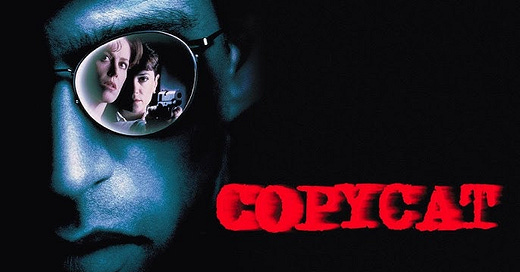Movie Review: Copycat (1995) – A Chilling Thriller That Knows Its Prey
Fear is the ultimate predator in this underrated ‘90s psychological thriller.
Every decade has its hidden gems—films that get overshadowed by louder, flashier blockbusters or Oscar-bait dramas. In the crime-thriller pantheon of the '90s, where Se7en, The Silence of the Lambs, and The Bone Collector stole the spotlight, there lies Copycat—a film that doesn’t scream for attention, but rather whispers… and sometimes, that's even scarier.
Directed by Jon Amiel and written by Ann Biderman and David Madsen, Copycat follows a psychological path instead of going full slasher or gore-fest. It’s a slow burn, deeply rooted in the trauma and psychological torment that both victims and investigators carry. This isn’t a body count movie—it’s a brain game.
The film opens with Dr. Helen Hudson, played by the always-commanding Sigourney Weaver. She’s a renowned criminal psychologist who specialized in profiling serial killers, until a horrifying attack by one of them—played with genuinely skin-crawling menace by Harry Connick Jr.—forces her into seclusion. She’s now a shut-in, dealing with extreme agoraphobia and PTSD, surviving in her high-tech (for 1995) apartment fortress with vodka, pills, and surveillance cameras as her closest companions.
But when a new killer begins recreating the grisly crimes of infamous murderers—Zodiac, Hillside Strangler, Son of Sam—it becomes clear this is no ordinary murderer. It’s someone playing a twisted game, and they want Hudson involved whether she likes it or not.
Enter Detective M.J. Monahan, portrayed by Holly Hunter in peak '90s form. Sharp, confident, and quick on her feet, Hunter’s M.J. isn’t the typical tough-cop stereotype—she’s intelligent, witty, and entirely human. Her chemistry with Weaver is the beating heart of the film. Their scenes together crackle with tension and mutual respect, without ever dipping into clichéd territory like forced romantic tension. This is two smart women navigating trauma, danger, and bureaucracy in a male-dominated space.
The killer, played by William McNamara, doesn’t get the pop culture praise of a Hannibal Lecter or John Doe, but his performance is effective in a more grounded, unsettling way. He’s not flashy—he’s ordinary. And that makes him far more terrifying. He watches. He studies. He imitates. And when he slips into the background, he could be anyone.
Where Copycat truly shines is in its atmosphere. The film is drenched in paranoia, dread, and psychological unease. The cinematography leans into shadows, cold tones, and tight spaces. The sound design—especially during the tense cat-and-mouse sequences—is subtle but spine-tingling. Every phone ring, creaky door, or flicker of static amps up the anxiety. This isn’t horror in the traditional sense, but the fear is real and constant.
It also explores trauma in a way that feels ahead of its time. Weaver’s portrayal of agoraphobia isn’t just surface-level—it's messy, raw, and authentic. Her fear isn’t just of the outside world—it’s of being vulnerable, of being seen, of being hunted again. And yet, she still finds the strength to help, to fight back, and to reclaim her agency.
That said, the film isn’t without flaws. Some of the supporting characters feel underdeveloped, including Dermot Mulroney’s Detective Reuben Goetz, whose subplot never fully blossoms. There’s also a tendency for the script to fall into procedural patterns in the second act. And yes, the 1995 tech—clunky computers, oversized monitors, floppy disks—is hilarious now, but that’s just part of the retro charm.
Despite this, Copycat is undeniably gripping. It blends classic suspense with character-driven drama, and while it doesn’t reinvent the genre, it executes its formula better than most. It understands that fear isn’t always about blood—it’s about the quiet creak down the hallway, the flicker of recognition in a copycat’s eyes, and the psychological scars left behind.
If you're a fan of slow-burn thrillers that reward patience with payoff—and if you like watching two powerhouse actresses go head-to-head with a monster—Copycat is a must-watch. It deserves more credit than it gets, and it holds up surprisingly well, even three decades later.
Rating: ★ ★ ★ ★ ☆ (4 out of 5 stars)





